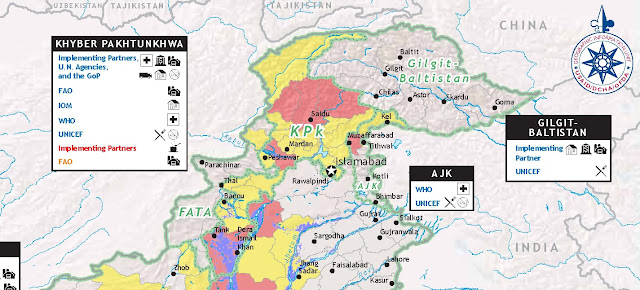Excerpt from the executive summary of the NOREF Policy Brief, via the Norwegian Peacebuilding Centre:Pakistan faces a multidimensional water crisis that claims hundreds of thousands of lives every year. The root causes of the crisis are twofold:
- Circumstantial, which are linked to poor water-resource management policies (including water-wasting flood irrigation);
- Structural, tied to factors deeply ingrained in politics and society such as the obsession with India, inequitable rural land-ownership and endemic water misgovernance (for example, exploitation of the rotational irrigation system to the detriment of the poor).
To resolve the crisis, both types of cause will need to be tackled, and the international community can play an invaluable role.
However, international responses must be measured. They should actively target the circumstantial causes but, at the same time, recognize that their ability to take on the structural ones is limited. While the international community can help mitigate the effects of the underlying structural drivers, Pakistan itself must take the ultimate steps to eliminate them.
Circumstantial causes can be addressed through international aid provision and international exchanges. Aid provision must be generous enough to meet Pakistan’s prodigious needs but modest enough to respect the country’s limited absorptive capacities. It should emphasize the restoration of infrastructure and distribution systems, be more responsive to the needs of Sindh and Baluchistan provinces, and be channeled through both government agencies and civil society.
Despite the challenges the international community faces in addressing the structural causes, opportunities do abound. These include embarking on back-channel diplomacy to bring Pakistan and India closer together and cooperative projects with Pakistanis to make water distribution more equitable. To be effective, international responses must target all affected parties and be sensitive to ground realities. They should also be mindful of indigenous success stories and the factors that bring about that success.
The full report, “International Responses to Pakistan’s Water Crisis: Opportunities and Challenges,” is available through the Norwegian Peacebuilding Centre.
Michael Kugelman is program associate with the Asia Program at the Woodrow Wilson International Center for Scholars.
Image Credit: Adapted from “USG Humanitarian Assistance to Pakistan for Floods in FY 2010 and FY 2011 (as of 30 Nov 2010),” courtesy of USAID and ReliefWeb.
 A Publication of the Stimson Center.
A Publication of the Stimson Center.




